- Home
- Jana Oliver
Madman's Dance (Time Rovers) Page 12
Madman's Dance (Time Rovers) Read online
Page 12
“How—”
“The top hat. Mr. Livingston’s is from Oxford Street. Yours is decidedly not.”
“Oh.” Recovering, Alastair slipped Ronald a generous tip. “Do you have any notion where he is?”
“No. I’ve not heard anything of him.”
“When he does reappear, give him this, will you?” Alastair handed over one of his personal cards. “It’s my new address. I must speak with him on an urgent matter.”
“Most certainly, sir.” Ronald’s voice was louder now. “Good evening, Mr. Livingston.”
“Good evening, Ronald.”
Alastair made it only a block away before he found a dark corner and shifted to his own form. While the ordeal left his stomach churning, the weariness resolved more quickly than he’d expected. After flattening the top hat and wrapping it in the cape, he headed home. In the morning he would speak to Lord Wescomb about the threat to Keats’ life. In some perverse way his friend might be safest in a prison cell.
~••~••~••~
Monday, 29 October, 1888
Old Bailey (Central Criminal Courts)
The report of Keats’ arrest had spread quickly, through the newspapers and by word of mouth. Alastair was not surprised to find the courtroom filling rapidly with an audience eager to see Keats in the flesh as he made his plea. It’d be worse when the actual trial began.
They love a show.
As he jostled forward in the crowd, he heard a voice call his name. For all the noise, it was remarkable he could hear it. He turned and was rewarded with a sight he’d never expected.
“Evelyn?”
She stood apart from the crowd, clad in an emerald-green dress edged in beige lace, her brown hair arranged stylishly under a matching hat. Behind her, he noted another woman. Her lady’s maid.
Up close, Evelyn Hanson looked more careworn than before. That wasn’t surprising, given that she’d been compelled to break two engagements within the span of a few months. Evidently, each personal disappointment had exacted a heavy emotional toll. When he finally reached her, he hesitated, unsure of how he might be received. What would her father think? Although Dr. Hanson recently had given him permission to see Evelyn again, his former employer had been the one to quash their engagement in the first place.
It would not hurt to be courteous. He owed her that much.
Alastair took her gloved hand and kissed it. Looking upward, he was pleased to note a subtle smile poised on her face.
“What brings you here?” he asked.
“You,” she replied simply. “I read of your friend and knew you’d be here to support him. I thought you might like support of your own.”
She doesn’t hate me. Relief washed over him. It could so easily have proven the opposite. He’d openly challenged her father about who should be deemed worthy of medical treatment, and the vehement argument had led to Dr. Hanson ending the engagement.
As if that weren’t enough, Alastair had dashed Evelyn’s future with her subsequent fiancée, by confronting the young rake and warning him that he might have contracted syphilis from Nicci Hallcox. Lord Patton had refused to be examined for the disease, seemingly unconcerned that he may pass the infection to his future wife. To Alastair’s surprise, Evelyn had sundered that engagement on her own.
“Alastair?” she nudged.
“Sorry, I was thinking about…all that has come to pass between us,” he said.
“I hold no anger for you over Lord Patton,” she told him, as if divining his thoughts. “How can I dislike a man who saved my life?”
He felt humbled. “You have no idea what this means to me.”
“Perhaps I do.”
Too overcome to speak, he offered a smile and guided her to seats in the spectator’s gallery, her maid trailing behind. The moment they were settled, there was a clamor. The doctor swiveled and watched as his best friend made his way into the dock. Keats was clean-shaven and wearing the suit Alastair had fetched for him. A rattling of chains accompanied the prisoner’s every move. The doctor could feel his stomach turning. This must be hell for him.
“He looks so calm,” Evelyn murmured.
“I suspect he has no other choice,” Alastair replied grimly.
Keats saw them at that moment, and the ghost of a smile appeared. He did look better than the night before. The doctor gave a reassuring nod and it was returned.
When the time came, Keats stood with a clank of chains.
“Not guilty, my lord,” he announced to the judge, his voice sure and strong.
“Not guilty? That’s a crock. He done her for sure,” a gent commented two seats away. “He’s a rozzer. He didn’t think he’d get nicked.”
“Shoulda stayed in Whitechapel,” another weighed in. “They’d-a never bothered him if he’d choked some whore down there.”
“Mind your tongue,” Alastair warned through gritted teeth, fighting back the urge to confront whoever deemed his friend capable of such barbarian conduct. The coarse man muttered a half-hearted apology, but didn’t retract his statement.
There would be no use arguing with any of them. They’d already convicted Keats. If hangings were still public, they’d be there, drunk as lords, to watch his friend twitch at the end of the rope.
With a sick anger lodged in the pit of his stomach, Alastair watched the inevitable play out. The court moved swiftly: Jonathon Davis Keats was remanded for trial for the murder of Nicola Hallcox.
With every step in this case, he’d hoped reason would prevail. What was Keats thinking? A quick look up to the dock yielded no answers. His friend’s face was unreadable.
The courtroom emptied rapidly. To her credit, Evelyn had remained throughout the entire ordeal, one time taking his hand for comfort. Having her here with him had made the horror bearable. When they reached the street, he turned to her. He had many things he wanted to say but reined himself in. He dare not in such a public venue.
“Would you…like to go for some tea?” he suggested.
She shook her head. “I must go home.”
Alastair’s hopes crashed to earth. She had only been here to comfort him, nothing more.
She adjusted her arm in his. “My father’s carriage is just there,” she said, gesturing farther down the street. They strolled toward the conveyance.
He took a gamble. “I would like to see you again, Evelyn, if you are agreeable.” The seconds ticked off. He heard none of the commotion around them, his attention riveted on what her answer might be.
“Perhaps we can go walking in Hyde Park tomorrow afternoon,” she offered. “Would that suit?”
“Of course,” he replied, before even considering his schedule. “May I call for you at…ah…two?”
Another smile appeared, this one much more reminiscent of when he’d first met her. “Yes. I would like that, Alastair.”
They reached the carriage and he handed her inside. After her maid was settled, Evelyn called out, “Tomorrow, then. I am looking forward to it.”
As am I.
~••~••~••~
“Quaint,” Anderson noted, looking around the main street of Ingatestone. They stood in front of a chemist’s shop. A sign in the window advertised Thermogene Medicated Wadding for all nature of chest ailments.
Ramsey took a deep breath. “Clean air. Not like London.”
“Or Chicago,” Anderson responded.
“Another nice thing about the country is that people pay attention, and they like to talk. If anyone saw Keats up here, they’ll want to jaw about it. It makes them famous, you see. They actually saw a killer.”
“Or an innocent man,” Anderson corrected.
After asking a helpful citizen who seemed impressed that they were from London, they found the local sergeant at his post in front of the dining hall. His hair was combed back, his moustache bushy. From the bulging of his coat buttons, apparently he was inside the establishment more than was prudent.
“Inspector Ramsey, Scotland Yard,” t
he inspector intoned. He offered one of his cards. The copper waved it away. “Need to ask you about the fellow who’s up for murder in London. Sergeant Keats says he was here in Ingatestone the middle of this month.”
“Heard about all that,” the man replied. “What you want to know?”
“Did you see the sergeant that day?” Ramsey asked, his notebook out.
“I probably wouldn’t have noted him. We get strange characters through here, what with the rail line and all. As long as they’re not up to mischief, I ignore them.”
“I see. Where are your pawn shops?”
The sergeant listed them off as Ramsey noted them. There were two.
“Did you or one of your constables go into the woods with Inspector Hulme to try to locate a coffin?”
“Who? Oh, that one. No, he didn’t go nowhere. Sat in the pub all evening.”
“Doing what?” Ramsey pressed.
“Nothing. Didn’t drink much, just a couple pints. Nursed them all night. Then he got on the train back to London.”
“Anything else you can tell us?”
A shake of the head.
“Then thank you for your time, Sergeant.”
“All I got,” the man said.
They finally tracked down the newspaper boy. He didn’t remember Keats, but then he didn’t seem the brightest of Ingatestone’s population. The eel-pie seller didn’t remember the sergeant, either.
“This isn’t a good start,” Ramsey commented, studying the list of pawn shops.
“Maybe he did make it all up.”
“Could be, but why go to all that effort? It’s too bizarre a tale.”
It wasn’t until they reached the second pawnbroker that someone recognized Keats’ photograph. He was seventy, if a day.
“I saw the gent. He pawned his boots here.” He looked down at the inspector’s card. “Never thought I’d ever talk to someone from Scotland Yard. Wait til I tell my missus. She’ll not believe it.”
“When did he pawn them?” Ramsey asked.
Muttering under his breath, the old fellow shuffled off, then returned with a ledger that looked as old as he was. He cracked it open and ran a bony finger down the columns of surprisingly neat writing.
“Wednesday, the seventeenth of this month, in the morning.” He looked up. “I keep track. Never know when it’ll be important.”
“Did he pawn anything else?”
“No, just a pair of boots. Excellent condition. I gave him top price. I could tell he hadn’t been down for long.”
“Down?” Anderson asked. “What do you mean by that?”
“Down on his luck, if you know what I mean. He’d been living rough, but not as long as some of them I get in here. His suit was dirty, but the cuffs weren’t frayed and his boots were almost new. He had that stunned look when life takes a bad turn. The ones who’ve been down for a time don’t have that anymore. They expect it to be bad.”
“Did he say anything?” asked Ramsey.
“He was right sad to pawn them. Said they were the best he’d ever had and once he got some money from his family, he’d be back. Keen not to lose ’em.”
“Did he buy another pair?”
“Right y’are. Sold him an old pair to tide him over. Nothing like the ones he pawned, I can tell ya that.”
“Do you still have those boots for sale?” Ramsey asked.
“I’m wearing ’em.”
“They’re evidence. We’ll need them for the trial.”
The man’s face fell. “They’re right fine boots.”
Ramsey dug in his pocket. “I’m willing to buy them from you.”
“You got the pawn ticket?” the fellow asked. “I like to get them back. Keeps my records tidy.”
“No, it went missing somehow.” Hulme had never explained just how that had happened.
A shrug. “Well, I supposed it don’t matter. You got something better than a pawn ticket,” he said, pointing to the inspector’s card.
The old man shuffled off again across the wooden floor. He returned in his stocking feet and placed the boots on the counter. “Fit me right perfect. I tried ’em on the moment he left. Needed a bit of cleaning, they were muddy and such, leaves stuck to the soles. They’re a good pair, that’s for sure.”
“Leaves? Like he’d been in a forest?” Ramsey quizzed.
“Just like that.” The fellow consulted his ledger and quoted the price. The inspector handed over the coins.
“Did this man have any injuries?” Anderson asked.
The inspector cursed to himself for not asking the question first.
“Yes. A bruise on his left chin. Nasty one. He said he tangled with a big Irishman.”
Ramsey and his companion traded looks. Keats had said he’d been struck a blow. “Has anyone else been to talk to you? Another inspector from London?”
A shake of the head.
Why hadn’t Hulme followed this lead? It was easy enough.
“You have a card, sir?” Ramsey asked. “We may need to call you to testify.”
The bony hand produced one. “I’d love to come to London. Never been there before.” He grew pensive. “Did that copper do what the papers say?”
“We’re not sure,” Ramsey replied, tucking the merchant’s card in a pocket.
The old man shook his head. “I’ve seen lots in my time. Mean ones. They have that look in their eyes, cut you for a farthing. This one didn’t. He looked lost, if you know what I mean.”
“Yeah, I do.”
Chapter 13
Alastair floated home, barely aware of his surroundings. His heart warred over the joy at seeing Evelyn again and the cruel reality of Keats’ future. His euphoria faded at the realization that unless Jacynda had dramatically improved during the day, there was little he could do to help her.
Mrs. Butler was drying the last of the new dishes and placing them in the Welsh dresser. “She doesn’t say much,” his housekeeper observed when he’d asked about their guest’s welfare. “Just does whatever you ask her. Not at all like she used to be. Simple, if you get my meaning.”
“Yes, I do.” Alastair knelt next to Jacynda’s chair. She studied him in return.
“Good afternoon, Jacynda.” A nod in response. She did look better. Her hair was clean and clothes fresh, though he could still see the bruises on her neck. “Did you have a good day?” Another nod.
“Fred,” she said, pointing to the stuffed animal in her arms.
“That’s his name is it?”
She nodded. “I saw some sheep today.”
“You like sheep?” he asked, reminded of similar conversations he’d had with his sister when she was a young child.
“I think so. They’re wooly. They smell.” She wrinkled her face in thought and then shook her head like a stray memory had wandered through her mind and then promptly got lost again.
Mrs. Butler was watching the exchange closely. “Are you sure you still want me to go out tonight?”
Alastair rose. “Most certainly. You and Davy deserve some time off after all the work on this house. I’m sure he’ll enjoy the lecture about the Antarctic. He seemed quite interested when I mentioned the penguins.”
“It’s just that the house isn’t—”
“It’s so much better than when I first stepped inside. You have done wonders. You can’t work day and night, or your health will give way again. Go out and have a good evening.”
“What about her?” Mrs. Butler asked, looking toward Jacynda.
“We’ll be fine. I am hoping to hear back from a specialist in brain diseases. I sent him a letter this morning. Perhaps he can find a way to help her.”
“That would be a godsend. Well then,” she said, putting down the last dish, “I’d best be going. I’m to meet Davy at the lecture hall.”
Alastair beamed, pleased at how matters had fallen out. “Enjoy yourself, Mrs. Butler. Have a late supper if you wish. You can afford it now.”
She shook her head in wonder. “I
can’t quite accept that yet.”
“You will, in time.”
At his request, Jacynda dutifully followed Alastair and then snuggled on the couch. He covered her lap with a blanket. In the distance, he heard the kitchen door close as Mrs. Butler hurried off to meet her son.
The parlour was even tidier tonight. Mrs. Butler had put the maid-of-all-work on her knees, scrubbing the floor for all she was worth. Even the rugs looked as if they’d been given a good beating.
“Another quiet evening,” Alastair mused. He could get used to this if his companion were more like her old self. They’d grown closer during all the events of the last few weeks. They’d shared their secrets and found a common bond. They might have shared this house together as husband and wife.
But not now.
There was a playful giggle from his companion. Jacynda was playing hide-and-seek under the blanket with the stuffed animal. If she was a child, it would have been amusing. Instead, it broke his heart.
He recalled his encounter with Evelyn, how unsure he’d felt around her. It’d never been that way, but he sensed she’d changed since the summer. There was an edge to her now, a tenuous self-assurance. He’d seen only a glimmer of that during their engagement, but now it seemed stronger. He wondered where it would lead.
Weary of brooding, he opened up the evening’s paper and read the account of Keats’ indictment while his companion stared into the fire. What was she thinking? Did she realize how much of her memory she’d lost?
“Would you like me to read to you?” he asked.
She nodded eagerly and he set about relating various short articles to her. The first was about the preparations for Bonfire Night.
“Have you ever seen fireworks?” Alastair asked. Jacynda shrugged. “Then we shall have to ensure you do.”
A knock on his front door, hard and heavy.
“Sounds like a copper,” he grumbled, rising.
Only one was a police officer—Inspector Hulme—and the other a nattily dressed man with piercing eyes and mutton-chop sideburns.
“Doctor,” Hulme said curtly. “I understand that Miss Lassiter is here.”

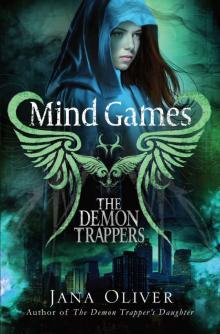 Mind Games
Mind Games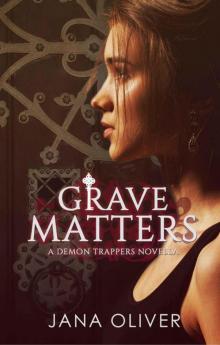 Grave Matters
Grave Matters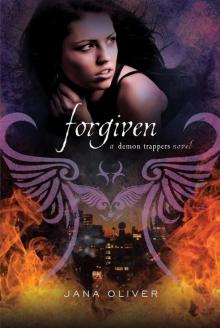 The Demon Trappers 3: Forgiven
The Demon Trappers 3: Forgiven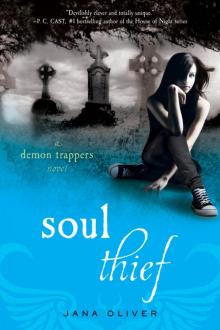 Forbidden
Forbidden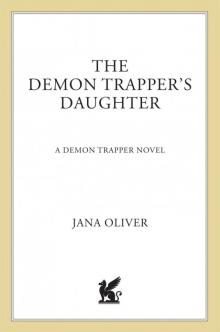 Forsaken
Forsaken Briar Rose
Briar Rose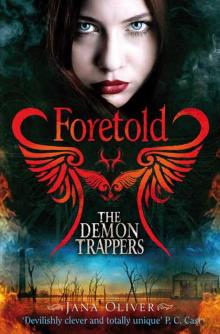 The Demon Trappers: Foretold
The Demon Trappers: Foretold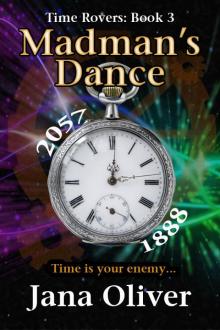 Madman's Dance (Time Rovers)
Madman's Dance (Time Rovers)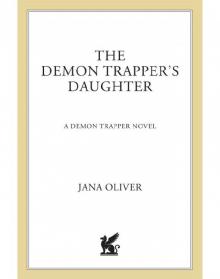 The Demon Trapper’s Daughter
The Demon Trapper’s Daughter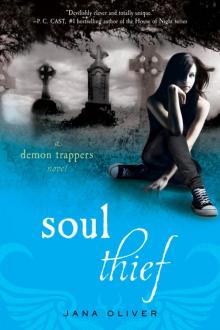 Soul Thief-Demon Trappers 2
Soul Thief-Demon Trappers 2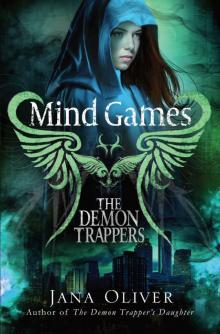 Mind Games (Demon Trappers Book 5)
Mind Games (Demon Trappers Book 5)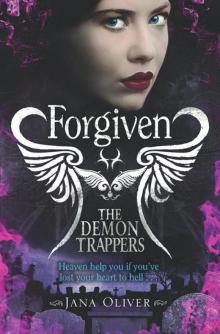 The Demon Trappers: Forgiven
The Demon Trappers: Forgiven